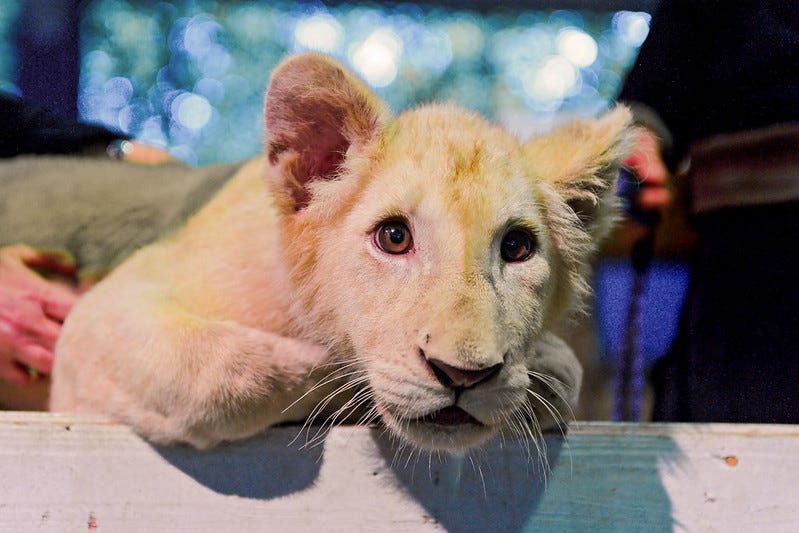How pet lions became a new high-class status symbol; Netflix highlights the pangolin; and trafficking TikTok fails
Wild Crime: updates from the week in the world of wildlife trafficking and environmental crime
For every person illegally smuggling and selling wild animals there is a person at the other end making a purchase. Wildlife trafficking is estimated to be the fourth largest criminal trade in the world – and it hasn’t become that way without demand.
But who is buying these wild animals? And why?
New Lines Magazine published a fascinating long read this week on one aspect of that question. In Albania, a Balkan nation which has a long history of corruption and organised crime, owning a big cat has become a status symbol for gangsters and social media influencers.
Reporters found numerous examples of individuals posting pictures and videos of lions on Instagram and other platforms. One restaurant even used a baby lion in a promotional post – where it was served a glass of red wine.
Other drivers of the trade exist, but the desire for exotic pets is a significant driver. The piece is also a good example of how the trade dovetails with other forms of serious crime.
It’s a great read. You can see it here.
South Africa: A new Netflix documentary is aiming to put a spotlight on an animal which is often described as the most trafficked in the world. Pangolin: Kulu’s Journey follows a three-month-old pangolin which is rescued from the illegal wildlife trade and undergoes a long process to return him to the wild. It’s directed by Pippa Earlich, who made My Octopus Teacher, an Oscar winner a few years ago, so she has some pedigree when it comes to wildlife films. (CNN)
USA: Eight critically endangered Fijian iguanas have found a new home at San Diego zoo after being rescued from illegal traders. The reptiles were some of 600 seized from smugglers in Spain in 2017 and have been housed at a research facility near Madrid since then. The ultimate goal is to return them to Fiji and geneticists in San Diego will now research how to do that safely. (USA Today)
Malaysia: One man is in court after a TikTok video exposed an illegal tiger head he had as decoration in a condo. After seeing the video the property was raided where investigators confiscated a full tiger pelt, displayed in a glass frame. It is illegal in Malaysia to keep tiger parts without a special permit. (New Straits Times)
Spain: Two NGOs have sued Spanish authorities accusing them of ignoring fishing vessels which repeatedly switch off their trackers while off the coast of west Africa. Such tracking technology is mandatory for all medium-to-large fishing boats, and the practice of switching them off is common among boats fishing illegally or in unregulated areas. The lawsuit, filed by NGOs Client Earth and Oceana, accuses the Spanish government of failing to investigate vessels. (Euronews)
Indonesia: Killing a critically-endangered tiger has landed a man with a five-year prison sentence in what is believed to be the heaviest handed down for wildlife crimes in Indonesia. The man was also fined $12,000. Sumatran tigers are the most endangered in the world with only between 400 and 600 remaining in the wild. The animal, an 18-month-old female, was caught in a trap and died after two days. (Mongabay)
Philippines: China has accused the Philippines of illegal fishing and construction activities that have been damaging coral reef ecosystems in the South China Sea. The claims were included in a new report released by China’s Ministry of Natural Resources based on a field investigation carried out between April and August last year. Satellite imagery shows that coral coverage in the area has reduced by 81 per cent since 2016, the researchers said. The two countries have clashed diplomatically over fishing rights in recent years. (Bastille Post)
India: Officers swooped before dawn and seized 473 live turtles in an operation against wildlife trafficking in Andhra Pradesh. The turtles were seized from a four-wheel drive with the animals allegedly bound for sale in local markets in Motu and Kalimela. The suspects were able to escape, but the turtles will be examined by vets before being released back into the wild. (Times of India)
US: Experts have warned that President Trump’s order to loosen fishing regulations in the Pacific Islands could have serious environmental consequences. The islands are home to a range of threatened and endangered species and the Kingland Reef, the most undisturbed in US waters. The decision was lobbied for by tuna lobbyists and allows for US-flagged vessels to fish commercially close to the designated national monument. (The Guardian)


